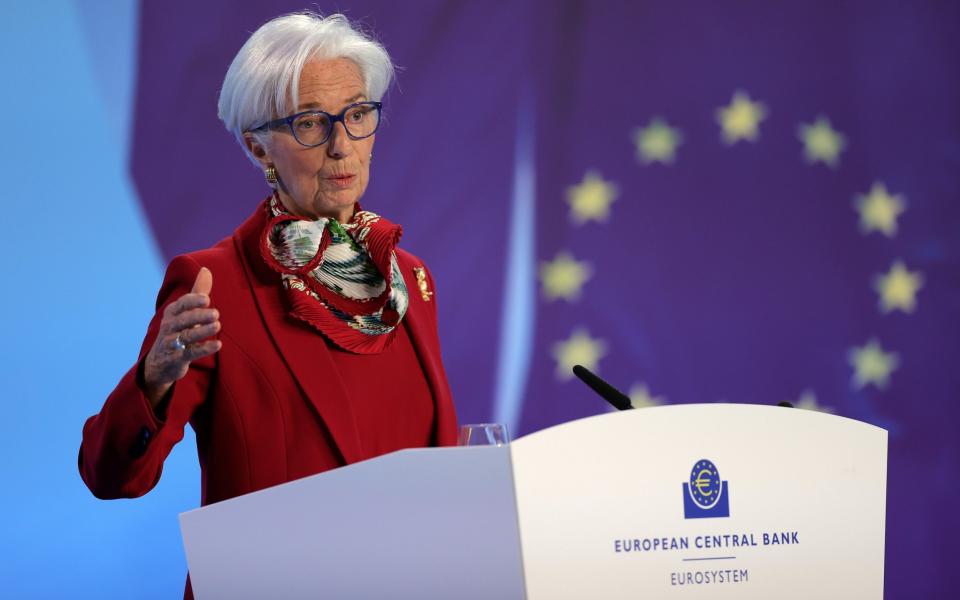Row breaks out between Brussels and the Swiss over Credit Suisse rescue deal

The Bank of England has attempted to reassure debt investors after the rescue of Credit Suisse triggered heavy losses and stoked fears of collateral damage to other banks.
Threadneedle Street and the European Central Bank both spoke out on Monday against the decision by Switzerland’s financial regulator to favour shareholders over bondholders in the deeply discounted sale of Credit Suisse to UBS.
Owners of $17bn (£13.9bn) of a type of bonds known as AT1s had their investments written down to zero in the hastily negotiated takeover, which was brokered by Swiss officials. It had been assumed that shareholders would be wiped out first but UBS agreed to pay $3.25bn for the equity.
In a joint statement, the ECB, the Single Resolution Board and the European Banking Authority said the Swiss had not followed the bailout hierarchy established after the financial crisis.
They said: “In particular, common equity instruments [shareholders] are the first ones to absorb losses, and only after their full use would AT1s be required to be written down.
“This approach has been consistently applied in past cases and will continue to guide the actions of the SRB and ECB banking supervision in crisis interventions. AT1 is and will remain an important component of the capital structure of European banks.”
The Bank of England also said that bank shareholders should bear losses ahead of bondholders in the event of a bank failure.
A spokesman for the Bank said: “Holders of such instruments should expect to be exposed to losses in resolution or insolvency in the order of their positions in this hierarchy.”
The unusual rebuke from Brussels and the Bank of England highlights the degree of concern among regulators that the fallout from Credit Suisse could continue.
International authorities acted on fears that the Swiss treatment of AT1s could undermine their wider use and cut off a crucial source of $275bn of funding for European banks. Bonds issued by other European lenders had plunged on concerns that other countries could repeat what happened in Switzerland.
Investors were last night considering legal action. Quinn Emanuel, a US law firm, said it was in talks with several Credit Suisse investors “representing a significant percentage” of the total notional value of the AT1s.
The bonds were introduced in the wake of the 2008 financial crisis as a mechanism to allow banks to be bailed out by investors, rather than taxpayers, in a crisis.
They are also known as CoCos, short for contingent convertibles, because they convert from debt into equity when a bank hits trouble. The mechanism should provide an automatic capital cushion for troubled lenders.
Despite the crisis, Credit Suisse told staff on Monday that it will deliver bonuses and pay rises as planned this year.
It came as shares in US bank First Republic plunged by as much as 50pc again on Monday after its credit rating was cut for the second time in a week.

JP Morgan chief Jamie Dimon was reportedly spearheading talks for a new rescue package for the embattled lender as the crisis among US regional banks rumbled on.
A group of Wall Street banks, including JP Morgan, last week clubbed together to provide $30bn to First Republic.
Meanwhile, Rishi Sunak moved to reassure investors that the UK’s banking system remained safe from contagion.
A Downing Street spokesman said: “We do believe we have a robust system, a strong system,” adding that UK banks are “safe and well-capitalised”.
Shares in London-listed banks and oil companies slumped again following the announcement of UBS’ takeover of Credit Suisse, with Standard Chartered and Barclays sliding 3pc and 2.3pc respectively, making them the two biggest fallers on the FTSE 100.
Gold also rose above $2,000 an ounce for the first time in more than a year after the banking crises in the US and Europe triggered a return to haven buying.
Following the announcement of the deal, UBS's five-year credit default swap spreads – an indicator of the likelihood that a borrower will pay its debts as they fall due – rose 24 basis points to 156. They were at 78 basis points a week ago.
The higher the CDS value, the greater the premium that an investor must pay to insure themselves against the default of the underlying asset
The value of UBS’s riskiest debt also plummeted. UBS debt yields, equivalent to an interest rate that the bank would have to pay, hit nearly 17pc.

 Yahoo Finance
Yahoo Finance 